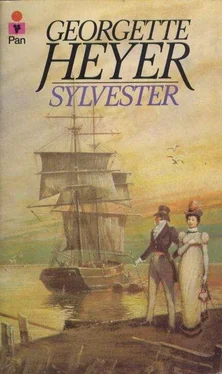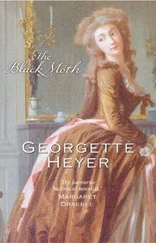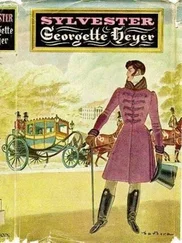Georgette Heyer - Sylvester
Здесь есть возможность читать онлайн «Georgette Heyer - Sylvester» весь текст электронной книги совершенно бесплатно (целиком полную версию без сокращений). В некоторых случаях можно слушать аудио, скачать через торрент в формате fb2 и присутствует краткое содержание. Жанр: Исторические любовные романы, на английском языке. Описание произведения, (предисловие) а так же отзывы посетителей доступны на портале библиотеки ЛибКат.
- Название:Sylvester
- Автор:
- Жанр:
- Год:неизвестен
- ISBN:нет данных
- Рейтинг книги:3 / 5. Голосов: 1
-
Избранное:Добавить в избранное
- Отзывы:
-
Ваша оценка:
- 60
- 1
- 2
- 3
- 4
- 5
Sylvester: краткое содержание, описание и аннотация
Предлагаем к чтению аннотацию, описание, краткое содержание или предисловие (зависит от того, что написал сам автор книги «Sylvester»). Если вы не нашли необходимую информацию о книге — напишите в комментариях, мы постараемся отыскать её.
Sylvester — читать онлайн бесплатно полную книгу (весь текст) целиком
Ниже представлен текст книги, разбитый по страницам. Система сохранения места последней прочитанной страницы, позволяет с удобством читать онлайн бесплатно книгу «Sylvester», без необходимости каждый раз заново искать на чём Вы остановились. Поставьте закладку, и сможете в любой момент перейти на страницу, на которой закончили чтение.
Интервал:
Закладка:
She laughed amiably at this thought, but the Duchess did not seem to be amused. She said nothing, but Miss Penistone saw her hands clasp and unclasp on the arm of her chair, and at once realized that no doubt she must be afraid that so rich a prize as Sylvester might be caught by some wretchedly designing creature quite unworthy of his attention. ‘And no fear of his marrying to disoblige you, as the saying goes,’ said Miss Penistone brightly, but with an anxious eye on the Duchess. ‘With so many girls on the catch for him I daresay you would be quite in a worry if he were not so sensible. That thought came into my head once-so absurd!-and I mentioned it to Louisa, when she was staying here in the summer. “Not he!” she said-you know her abrupt way! “He knows his worth too well!” Which set my mind quite at rest, as you may suppose.’
It did not seem to have exercised the same beneficial effect on the Duchess’s mind, for she put up a hand to shade her eyes. Miss Penistone knew then what was amiss: she had had one of her bad nights, poor Elizabeth!
3
Sylvester made no further mention of his matrimonial plans; nor, since she could not fail to be cheerful whenever he came to visit her, did he suspect that his mother was troubled for him. Had he known it he would have supposed her merely to dislike the thought of his marriage, and would not have found it difficult to put any such scheme aside; if she had told him that she was more disturbed by the fear, which was taking uncomfortably strong possession of her mind, that he had become arrogant he would have been distressed to think that he could have said anything to put such a notion into her head, and would have done his best to joke her out of it. He knew it to be false: he was acquainted with several persons to whom the epithet might well apply, and he thought them intolerable. Few men were more petted and courted than he; there were not many hostesses who would not have forgiven him such slights as were not uncommonly dealt them by spoiled men of rank and fashion. But no hostess would ever be given cause to complain of Sylvester’s courtesy; and no insignificant person who perhaps rendered him a trifling service, or even did no more than touch his hat to him, would have reason to think himself despised. To reserve one’s civility for people of consequence was a piece of ill-breeding, dishonourable to oneself, as disgusting as to make a parade of greatness, or to curse a servant for clumsiness. Sylvester, who did not arrive at parties very late, refuse to stand up for country dances, take his bored leave within half an hour of his arrival, leave invitations unanswered, stare unrecognisingly at one of his tenants, or fail to exchange a few words with every one of his guests on Public Days at Chance, was not very likely to believe that a charge of arrogance levelled against him was anything but a calumny, emanating probably from a tuft-hunter whom he had snubbed, or some pert mushroom of society whose pretensions he had been obliged to depress.
The Duchess knew this, and felt herself to be at a loss. She would have liked to have been able to consult with someone who had his interests as much to heart as herself, and must know better than she (since she never saw Sylvester but in her own apartments) how he conducted himself in society. There was only one such person; but although she felt both respect and affection for Lord William Rayne, Sylvester’s uncle, and for two years his guardian, very little reflection was needed to convince her that any attempt to get him to enter into her rather vague apprehensions would only make him think her the victim of such crotchets as might be expected to attack an invalid. Lord William was old-fashioned, very bluff and kind, but very full of starch as well. He had some influence over Sylvester, of whom he was as fond as he was proud: a word from him would carry weight, but unfortunately one of his terse reproofs would be more easily drawn from him by what he thought a failure on his nephew’s part to remember his exalted station, than by his placing himself on too high a form.
He stayed at Chance at Christmas, and so far from affording the Duchess reassurance considerably depressed her, though this was far from being his intention. He had nothing but praise to bestow on Sylvester. He told the Duchess that the boy did just as he ought, his manners being particularly correct. ‘Very affable and civil, you know, but knows how to keep a proper distance,’ said Lord William. ‘No need to fear he’ll forget what he owes to his position, my dear sister! He tells me he’s thinking of getting married. Very proper. High time he was setting up his nursery! He seems to be going about the business exactly as he should, but I dropped him a hint. Don’t think it was necessary, mind, but I shouldn’t like to see him make a fool of himself for want of a word of advice. But thank the lord he’s got no rubbishing romantical notions in his head!’
It was the immutable custom of the House of Rayne for as many members of it as could possibly do so to gather together at Christmas under the roof of the head of the family. As the family was enormous, and most of those who congregated at Chance remained for a month, Sylvester had little leisure, and saw less of his mother than he liked. He was an excellent host and he had an excellent supporter in his sister-in-law, who, besides having a turn for entertaining, very much enjoyed acting as deputy for the Duchess, and consequently became more cheerful as soon as the first of the visitors crossed the threshold. Her pleasure was only marred by Sylvester’s refusal to invite Sir Nugent Fotherby to join the party. She argued that if he could invite her father and mother he could with equal propriety invite her affianced husband, but any intention she might have had of developing this grievance was checked by the intervention of both parents. Lord Elvaston, to whom Sir Nugent was objectionable, informed her that if he had found the fellow at Chance he would have gone home instantly, and Lady Elvaston, though willing to tolerate Sir Nugent for the sake of his vast wealth, told her that if she thought to win Sylvester round by affording him the opportunity of studying that amiable dandy at close quarters she was no better than a ninnyhammer.
Sylvester left Chance towards the end of January, a day later than his last, lingering guest. He was bound for Blandford Park, whither his hunters were sent by the direct route from Leicestershire; but he went first to London, a deviation that caused no surprise, since he told his mother he had business there. As it was hunting, not matrimony, that took him to Blandford Park she was able to see him off without any immediate apprehension of his proposing to one of the five eligible candidates for his hand. None of these ladies would be at Blandford Park; and it was in the highest degree unlikely that they were to be found in London either, at the end of January. The Duchess believed he would be granted little opportunity to commit his contemplated imprudence until the beginning of the season. But he had omitted to tell her what was his chief business in town. He went to pay a morning visit to his godmother.
The Dowager Lady Ingham lived in Green Street, in a house bursting with all the furniture and ornaments she had insisted on removing from Ingham House on the occasion of her son’s marriage, and her own retirement to Green Street. Any piece for which she had a fancy she insisted was her personal property; and since neither Ingham nor his gentle bride was a match for her she bore off several heirlooms, handsomely promising, however, to bequeath them to their rightful owner. She also removed the butler, but as he was growing old and was obstinate in his adherence to customs Lord Ingham thought obsolete, this was not felt to be a loss. He was now considerably stricken in years, went about his duties in a slow and stately manner, and discouraged the Dowager from holding any entertainments more arduous than a small soiree, or a card-party. Fortunately she had no wish to give dinner parties, or breakfasts, excusing herself on the score of age and infirmity. She was not, in fact, much above five-and-sixty; and beyond a tendency to gout no one had any very clear idea of what her infirmities might be. She certainly walked with the aid of an ebony cane; and whenever she was confronted with any disagreeable form of exertion she was threatened with palpitations, and was obliged to send for Sir Henry Halford, who understood her constitution so well that he could always be depended on to recommend her to do precisely what she wished.
Читать дальшеИнтервал:
Закладка:
Похожие книги на «Sylvester»
Представляем Вашему вниманию похожие книги на «Sylvester» списком для выбора. Мы отобрали схожую по названию и смыслу литературу в надежде предоставить читателям больше вариантов отыскать новые, интересные, ещё непрочитанные произведения.
Обсуждение, отзывы о книге «Sylvester» и просто собственные мнения читателей. Оставьте ваши комментарии, напишите, что Вы думаете о произведении, его смысле или главных героях. Укажите что конкретно понравилось, а что нет, и почему Вы так считаете.












